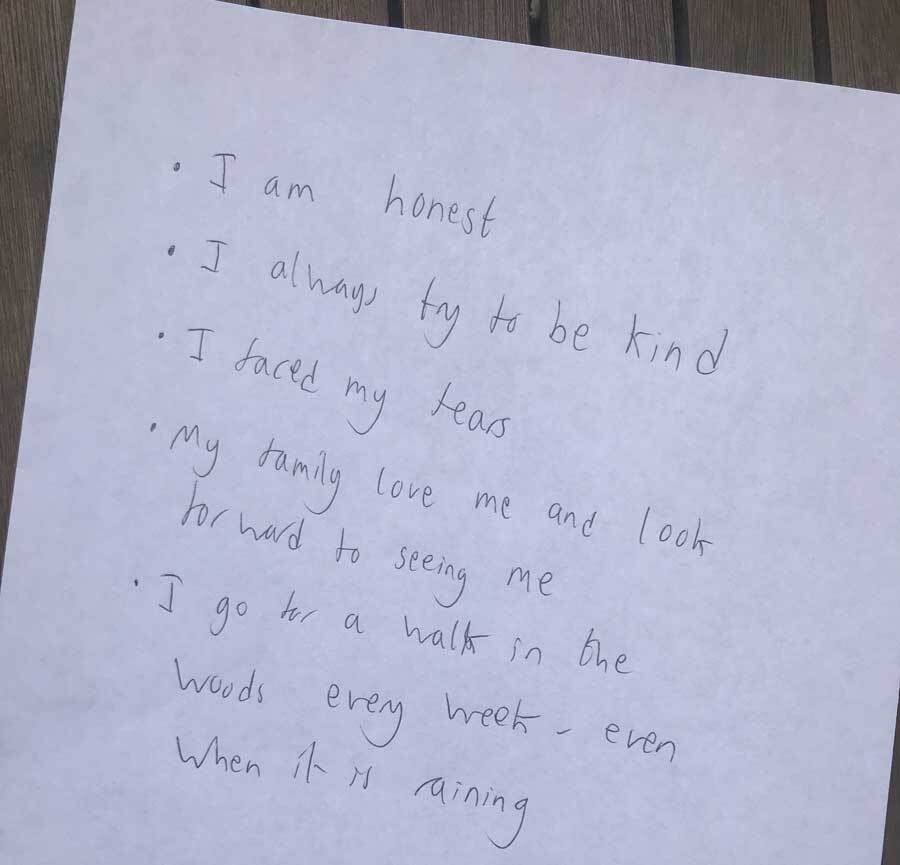
Why you should write a list of your positive qualities
Writing a list of your good points might sound like a vain or egotistical thing to do. Or it may feel like you would have nothing to write. But doing this exercise can provide a significant boost to your mood.
What is it?
It’s literally just writing a list of your best qualities. Take a piece of paper and bullet point as many positive qualities as you can.
It is best to physically write it. There is something about writing them out by hand, rather than on a computer, which makes it more real. Don’t worry about your handwriting but do take your time.
This isn’t a static exercise. If you think of more things later, add them. If things get too messy, you. An always transfer everything to a fresh sheet of paper.

What makes a good point?
You could write abstract ideas such as “I am kind” or “I am hardworking”, but it might not be the most effective way because such abstractions have very little emotion behind them.
A better way is to use specific examples. Take things you do or things you have done. After all, actions speak larger than words. For example, you could write:
- I looked after my mum when she was ill
- I volunteer at a local charity
- I continued to go to therapy even though I found it very uncomfortable
Some qualities you may not feel you really deserve. This belief is not surprising given that we often look on the negative side. If so, you could add “I try”. For example, “I try to be a caring person.” That way, even if you don’t feel you embody the quality 100% of the time, you can still include it.
More examples
If you are stuck for ideas, here are some more examples that might inspire you. Some are wider personality traits, but some are small or may even seem silly. Include these, too, as they may be more important to other people than you think.
- I send holiday cards to my friends
- I always like other people’s photos on Instagram
- Honesty is very important to me
- I’ve avoided alcohol for six months
- My family look forward to seeing me
- I have the strength to keep going, even when I am at my lowest
- I’ve raised money for good causes
Why do it?
So far we ha e covered what to do, but the question is “why would we do this?”
The answer is that as anxiety sufferers, we often look on the negative side. Many of us regularly think of ourselves as worthless. This thought isn’t an accurate view of ourselves but we may feel that way nevertheless.
Thinking of ourselves in a positive way is incredibly hard to do when we are at our lowest.
That is why it is important to have a list physically written down in your own handwriting. It is a letter to your future self to help you feel better when you are low.
What if I can’t think of anything?
This exercise is not one you need to rush. Take your time and see what comes to mind. It doesn’t have to be done in one sitting; you can add to it at any time.
So, maybe on day one you simply pin the piece of the fridge. That way you can add to it whenever you think of something or experience a little victory.
If you’re stuck, review the examples given in this article. They should inspire you to think about the various aspects of your life and the good things about them.
Or, the best way, as we will discuss below, is to get other people to suggest items for you.
Get other people to contribute
An alternative take on the technique is to get someone else to write the list for you, such as a close friend or family member. Or both, you don’t need to limit yourself to a single list!
They will probably think of things that you would never imagine. And it gives you valuable insight into what qualities other people value in you.
Summary
Writing a list of your positive qualities is like writing a list to your future self. It is something you can use to pick you up when you are at your lowest. Once you get going, you will probably find you have many positive qualities, and it is a fun thing to do.
So, the question is, what will be the first item on your list?
Related articles
Metadata
Published 21 May 2018. Written by Chris Worfolk.

